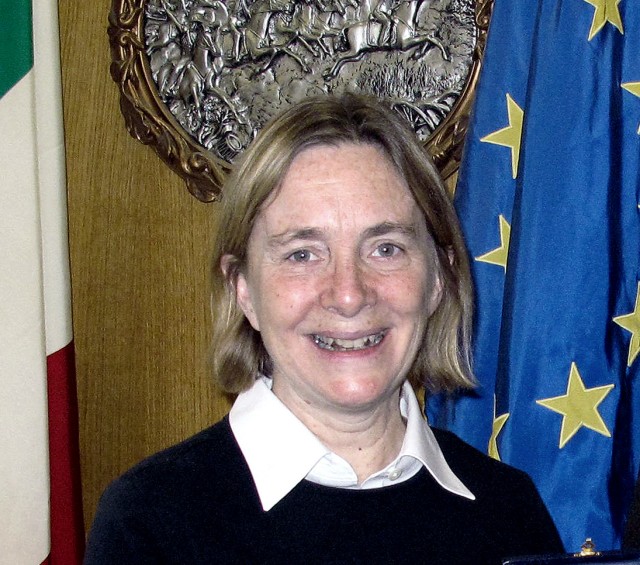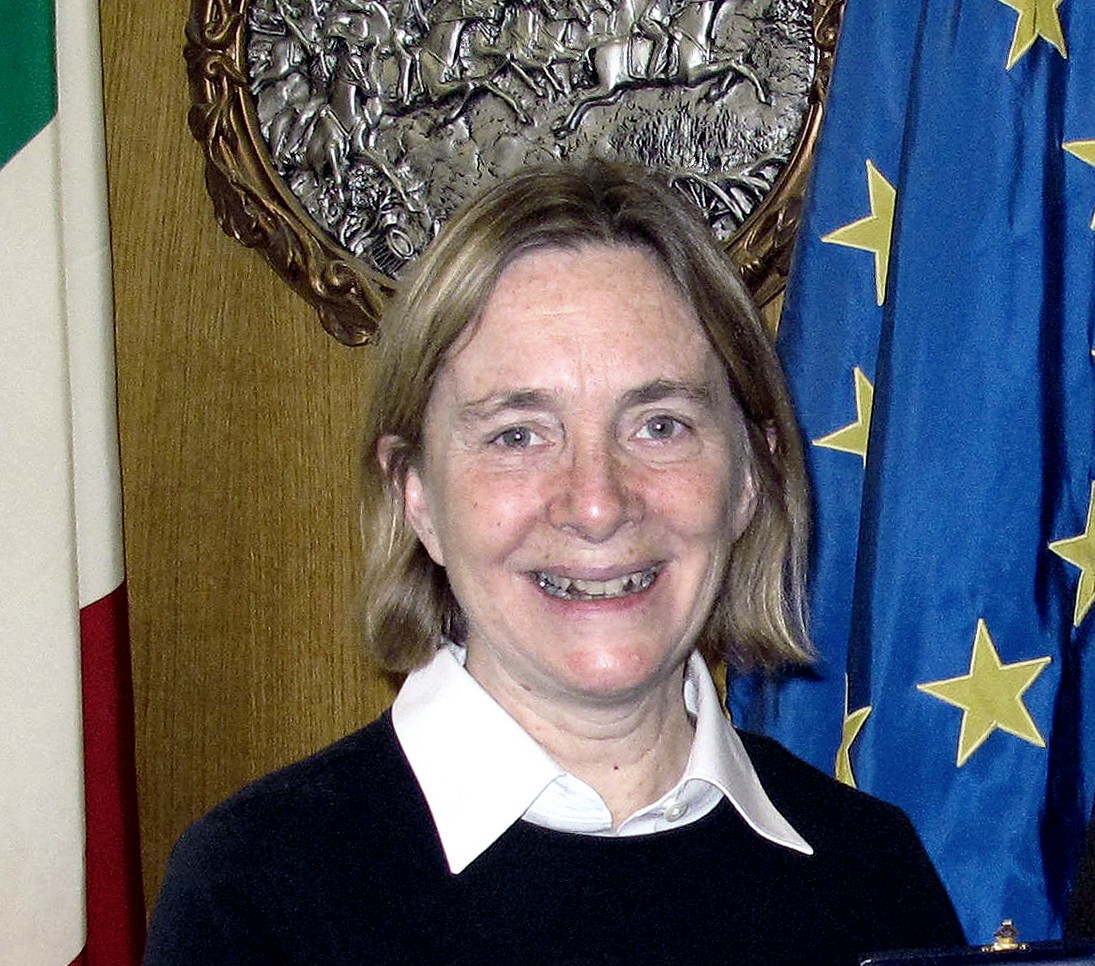FORT DRUM, N.Y. -- A Fort Drum-based archaeologist who became the first-ever DoD employee to win a scholarship to the prestigious American Academy in Rome says she is digging up key insights and discoveries during her studies that are impacting everything from NATO training to preservation efforts in turbulent Middle Eastern cities.
"I think that the events in Egypt, Tunisia (and elsewhere), illustrate how critical it is to have an educated fighting force prepared for cultural property protection anywhere in the world," said Dr. Laurie Rush, Fort Drum's cultural resource manager, during a brief trip to the U.S. halfway through her research at the influential think tank.
"You just don't know where in the world there is going to be a natural disaster or a conflict," she said.
Rush educates Soldiers on the importance of preserving sacred and historic sites, both on Fort Drum - where many Native American ancestral places have been discovered - and overseas, in Middle Eastern theaters of war.
Since taking over Fort Drum's Cultural Resource Program in 2001, Rush and her colleagues have won nearly a dozen Army- and DoD-level awards. She also won significant attention a couple of years ago for creating more than 150,000 decks of Heritage Resource Preservation pictured playing cards, disseminated to troops in Afghanistan and Iraq to help Soldiers identify and protect ancient artifacts and archaeological sites they encounter in the field.
After receiving the academy's Rome Prize last summer, Rush, along with 32 other American scholars and artists, left for Italy in September to conduct advanced research in categories such as architecture, literature, medieval studies and musical composition.
Rush's studies in the academy's historic preservation and conservation program don't differ drastically from her chief role for the Army, where she fosters respect among deployed Soldiers for archaeological sites, historic buildings and sacred places. She said she hopes to have enough research material by the end of her time in Rome to write a DoD handbook enabling service members to effectively recognize cultural property in unfamiliar landscapes.
"Dr. Laurie Rush's work at the American Academy in Rome exceeds what most of us can comprehend," said James Corriveau, director of Fort Drum's Public Works, which oversees Rush's department. "Her work in Italy this year serves to enhance her capabilities and set the stage for greater achievement in the years ahead as the Army's mission continues to become ever more challenging.
"It makes me so proud as she magnificently represents the Fort Drum garrison while working internationally," he added.
In an idyllic villa situated at the top of nearly 200 steps on Janiculum Hill and overlooking Rome, Rush said she works in an expansive two-story studio surrounded by umbrella pines.
"I love Rome," Rush said. "I wake up every morning finding it miraculous that I'm there. I am filled with wonder. It's just a spectacularly beautiful place."
She said a typical day at the academy involves researching, lecturing, networking, e-mailing correspondences and sightseeing. One of her favorite visits so far was to the Catacombs of Rome, where she said she joined a procession during the Feast of San Sebastiano led by a priest and participants holding candles.
Food has been an extraordinary experience as well. Aside from the academy's gourmet coffee bar that serves homemade pastries, Rush said she enjoys the all-organic dishes, such as fettuccine with porcini mushrooms and pine nut caramel tortes, as well as the exquisite taste of sweet blood oranges.
"Meals are absolutely fabulous - it's so good that it's almost impossible to describe," she said. "Everything made is in season. I haven't seen a single frozen food item since I arrived in Rome.
"It's fascinating," she added, "because you get a sense of the rhythm in terms of the seasons. The artichokes come in. You will have that at a variety of meals. Then another green comes into season."
The American Academy in Rome is a 117-year-old private group that fosters the creative and scholarly pursuits of American intellectuals who work and teach in the arts and humanities. It publishes scholarly works; sponsors exhibitions, concerts and lectures; and maintains a library of more than 140,000 volumes in the fields of classical studies and the history of art and architecture, a photographic archive and an archaeological study collection.
While in Rome, Rush said she has been particularly intrigued by Italy's classy Carabinieri - a national police force well trained in cultural property preservation. She said the Carabinieri is the only deploying force in the world capable of cultural resource missions.
"Studying the Carabinieri has been such a privilege - they are so impressive," Rush said. "I think that this almost magical recipe of expertise in public service and a commitment to saving cultural patrimony really gets results.
"They take tremendous pride in the fact that they are police and that they are there to save their country's heritage," she added.
Rush also has visited the NATO Defense College in Rome to encourage officials there to add cultural property protection courses to their curriculum. In addition, based on her recent meetings with civil affairs officials near Venice, Rush said NATO decided to adopt one of her museum scenarios into the next training.
Meanwhile, in downtown Rome, she wants to develop self-guided tours that contain military lessons learned for sightseeing NATO students.
"I actually want to make an iPhone app for this," she said.
Recent events in Egypt are one example, Rush said, in which safeguarding cultural property becomes vital. She said immediate international concern followed the popular uprising there that led to reports of alleged looting at the National Museum in Cairo and other areas.
At the height of the unrest earlier this month, Rush said she managed to help facilitate a mission to Cairo spearheaded by Joris Kila, chairman of the International Military Cultural Resources Work Group, and Karl von Habsburg, president of the Association of National Committees of the Blue Shield - the cultural equivalent of the Red Cross.
The two officials reported after five days of inspections in museums and archaeological sites that, in general, Egyptian citizens and military personnel had demonstrated significant care for their country's heritage. Because the damage and theft in and around Cairo was apparently minimal, Rush noted it was the Egyptian people's knowledge and sense of pride in their country's cultural property - especially members of the military - that helped preserve priceless antiquities.
It is that pride in the heritages of the world's cultures that Rush seeks to instill in the warfighter. Her passion is to make an understanding of cultural property issues military-friendly, especially during the 10th Mountain Division's (LI) current counterinsurgency operations in Afghanistan.
One of the Army's leading archaeologists said she believes a unit's cultural awareness and sensitivity is essential to its mission.
"I really believe that we have had situations where there were aspects of the landscape that were very sacred to local people that we just were unable to identify, or that didn't look important," Rush said. "Grave markers are one of them. My sense of it is that if you ran that over with a military vehicle, perhaps repeatedly, you might make someone angry enough, especially if it is their child's grave, to put an IED there - and you would never know what it was that you did.
"If something like that happens, that just fuels fury in the Islamic world," she continued. "(Ancient) war strategy talks about not just killing people, but destroying their sacred places. It makes people really hate you. It demoralizes them. Conflict resolution becomes extremely difficult."
Given the division's level of engagement in Afghanistan, Rush said she has some concerns over some of the efforts and stability operations, however well-intentioned, as they relate to water projects.
"While in Rome, I have had the luxury of being able to focus on international issues full-time," Rush said. "I am helping to a coordinate a major research project for rebuilding ancient water systems in Afghanistan as opposed to us digging wells, which is actually maybe doing more harm than good."
She said the Afghans have traditional water systems that tap aquifers out of a slope, successfully channeling and distributing it into villages through irrigation canals. The Russians made a point of damaging some of these systems when they left, Rush said, which is one reason Helmand Province reverted to poppies to some extent, since they don't require as much water as pomegranates or other orchards.
"American's approach is to typically dig a well," she said. "If you dig a well, you may tap that same aquifer and dry up their traditional system, which is going to really disrupt the social fabric of the community and make people very angry. When the people are angry, our 10th Mountain has to deal with them."
Through high-level contacts with the Army Corps of Engineers, however, Rush said she has offered guidance on how U.S. forces in Afghanistan should proceed.
"It's going to take time, because it requires a huge paradigm shift for Army engineers who are very proud of doing it the American way," she said. "(But) given the U.S. investment there, if the idea in Afghanistan is a long-term and stable peace, then showing respect for cultural property is a key piece."


Social Sharing